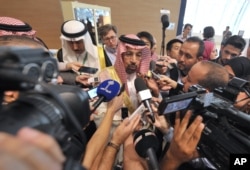Oil prices have been bouncing up and down recently, as a sputtering global economy meant faltering demand for energy. The balance between crude oil supplies and energy demand has been rattled further by surging competition from wind and solar energy, a deal to limit production by members of the Organization of Petroleum Exporting Countries, and unrest in some key oil-producing nations.
A U.S. government analyst says "global supply has far exceeded global consumption," for the past year and a half, but that gap is narrowing.
Hanna Breul of the Energy Department's Energy Information Agency says that as the supply surplus diminishes, prices rise. Prices are likely to continue rising in the short term, she says, while demand for oil will grow well into the future.
Weighing oil supply and demand is complicated. For example, U.S. oil output surged in recent years due to expanding shale oil production, contributing to a glut that hurt prices. Breul says shale oil production needs continued drilling and investment to be productive. Low oil prices dried up money for such oil operations, and that cut U.S. production.
Faltering U.S. oil production made it necessary to bring more crude oil into the country, and oil imports reached a six-year high recently.
OPEC deals
These market gyrations come at the same time as members of the OPEC cartel say they have worked out a deal to cut oil production to boost prices.
Prices fell from about $100 a barrel a couple of years ago to less than $30, which caused serious problems for oil companies and nations dependent on oil exports for revenue. OPEC pumps about one-third of the world's petroleum, and news that OPEC members and some other major oil producers might agree to limit output pushed prices back up to around $50 a barrel on global markets recently.
The OPEC cartel is scheduled to meet in late November to work out details of their agreement to cut production, including the difficult negotiation on which nations will cut how much. Several OPEC nations, including war-torn Iraq, are asking for exemptions to quota cuts.
Nevertheless, after a recent meeting with top OPEC officials, Russia's Energy Minister Alexander Novak said, "Ahead of OPEC taking its final decision, we are working out different options and mechanisms of OPEC and non-OPEC countries participation in finding out joint agreements."
Saudi minister of Energy, Industry, and Mineral Resources Khalid Al-Falih said he is "optimistic" the oil market will "continue to improve."
Surge in solar, wind
While oil producers may be working out an agreement, their competitors are also very busy.
The International Energy Agency says there was a surge in the number of solar energy installations with half a million solar panels going in each day in 2015. Wind energy facilities also increased with two wind turbines installed every hour during the year. The IEA says the cost of producing electricity from wind has fallen by one third since 2010, while solar electricity costs dropped even more. The IEA called the changes "transformational."






